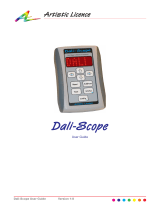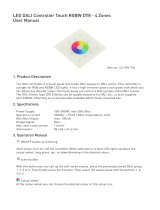Page is loading ...

DIN-DALI-2
DIN Rail 2-Channel DALI
®
Interface
Operations & Installation Guide
Hardware Hookup
Make the necessary connections as shown below. Apply power after all connections have
been made.
CAUTION: Connecting this device to the wrong type of load or short circuiting the load
can cause severe product damage. Each load should be tested to identify a short circuit
condition prior to wiring the load to the module.
NOTE: Use copper wire only. For high-voltage connections, use wire rated for at least
75º C (167º F).
NOTE: Ensure the unit is properly grounded by connecting the chassis ground lug to an
earth ground (building steel).
NOTE: To prevent overheating, do not operate this product in an area that exceeds the
environmental temperature range listed in the specications table on the Crestron
website.
When making connections to the DIN-DALI-2, use Crestron power supplies for Crestron
equipment.
Operation
Enter Override Mode
The Override mode overrides the control system program and sets all ballasts on both
networks to their precongured or factory default override values. To enable Override mode,
press and release the OVR button. The OVR LED ashes slowly.
NOTE: If Override mode was enabled from an external device (e.g., a contact closure is
present on the OVERRIDE terminals), the OVR LED ashes quickly. Pressing the OVR
button has no effect.
To disable Override mode, press the OVR button again. The OVR LED extinguishes and the
outputs return to the states set by the control system program.
Test the Ballasts
To verify that all ballasts have been properly wired, DALI 1 TEST and DALI 2 TEST buttons
are provided for each network (DALI1 and DALI2). To toggle all ballasts on a network on or
off, quickly tap the DALI 1 TEST or DALI 2 TEST button. To dim all ballasts on a network
up or down, press and hold the DALI 1 TEST or DALI 2 TEST button.
Reboot the DIN-DALI-2
To reboot the DIN-DALI-2, press the RESET button. The outputs are set to the states
currently specied by the control system program. If the control system does not provide
any values, the outputs are set to their previously set values.
Set the Net ID
The Net ID is set using the front panel.
1. Press the SETUP button to enter the Setup mode. The SETUP LED illuminates.
2. Press the left button under the NET ID display to change the left digit of the Net ID or
press the right button under the NET ID display to change the right digit of the Net ID.
3. When the desired Net ID is displayed, press the SETUP button to exit Setup mode.
The SETUP LED extinguishes.
NOTE: If an invalid Net ID is set (00, 02, FF), “Er” appears on the NET ID display
and the DIN-DALI-2 reverts to the previously set Net ID.
NOTE: The DIN-DALI-2 leaves Setup mode after 10 seconds of inactivity. The
DIN-DALI-2 reverts to the previously set Net ID.
NOTE: A small label (with numbers and letters) is provided on the front panel of the
DIN-DALI-2 to document the unit’s Net ID in the case where power is not available.
Apply a mark over the digits that correspond to the assigned Net ID.
NET ID Label (“3C” Shown)
Description
The DIN-DALI-2 is a DALI
®
interface for Crestron
®
systems that provides control of up to
two individual DALI loops. Housed in a DIN-rail enclosure, the DIN-DALI-2 is a great
low-prole Cresnet
®
or Ethernet companion to the DIN-AP3 processor or any 3-Series
®
control system. In addition to controlling the DALI data bus, it includes an integrated DALI
power supply. Single-wire connectivity simplies both new and retrot installations, and
Power-over-Ethernet (PoE) versatility assists in situations with existing CAT5
infrastructure.
3. Press and hold the applicable DALI 1 TEST or DALI 2 TEST button for 3 seconds to
initiate reprogramming of the new ballast. Once the new ballast has been
programmed, the DIN-DALI-2 returns to normal operation and the NET ID display
shows its Cresnet ID.
Transfer Addressing and Programming to Multiple Replaced Ballasts
Use the following procedure to transfer addressing and programming information to the
ballasts.
1. Press and hold the left and right buttons under the NET ID display for 5 seconds until
“br” is shown on the display.
2. Within 10 seconds, tap the DALI 1 TEST button. The NET ID display blinks “br”
while the device discovery process is running. This may take a few minutes to
complete. When discovery is complete, the rst new ballast found on loop 1 begins
ashing to indicate that it has been selected for addressing. The display shows the
address of the rst missing ballast (in hex, i.e., 00 to 3F). Use the left and right
buttons under the NET ID display to assign the address to the ashing ballast. Refer
to the “Hex to Decimal Lookup” table for more information.
Hex to Decimal Lookup
Installation
WARNING: To avoid re, shock, or death, turn off the power at the circuit breaker or
fuse box and test that the power is off before wiring!
CAUTION: This equipment is for indoor use only. Mount it in a well-ventilated area. The
ambient temperature must be 0º to 40º C (32º to 104º F). The relative humidity must be
10% to 90% (non-condensing).
NOTE: This product should be installed and used in accordance with appropriate
electrical codes and regulations.
NOTE: This product should be installed by a qualied electrician.
NOTE: When installing in an enclosure, high-voltage devices should be grouped
separately from low-voltage devices.
NOTE: Strip the ends of the wires approximately 1/4 in (6 mm). Use care to avoid
nicking the conductors. Twist together the ends of the wires that share a connection.
Apply solder only to the ends of the twisted wires. Avoid tinning too far up the wires or
the end becomes brittle.
NOTE: Before using the DIN-DALI-2, ensure the device is using the latest rmware.
Check for the latest rmware for the DIN-DALI-2 at www.crestron.com/rmware.
Firmware is loaded onto the device using Crestron Toolbox™.
Install the DIN-DALI-2
The DIN-DALI-2 is designed for installation on a DIN rail. Refer to the illustration that
follows.
1. Use a at object (e.g., a at-head screwdriver) to pull the DIN rail release downward.
2. With the top of the unit tilted down, place the DIN-DALI-2 against the bottom of the
DIN rail.
NOTE: When mounting DIN rail products, it may be necessary to use a at-head
screwdriver to pull the DIN rail release tab down while snapping the device onto
the DIN rail.
3. Tilt the top of the DIN-DALI-2 toward the DIN rail until it is secure on the top edge of
the rail. Push the DIN rail release upward to lock the DIN-DALI-2 into place.
Additional Resources
Visit the product page on the Crestron website (www.crestron.com) or
scan the QR code to the right for additional information and the latest
rmware updates.
LAN POE:
To Control System,
Other Cresnet
Devices, and PC
Running
Commissioning
Software
OVERRIDE:
From Device Providing
Override Signal and to
Other Devices Receiving
Override Signal
NET:
To Control System and
Other Cresnet Devices
DALI1:
To DALI
Network #1
DALI2:
To DALI
Network #2
COMPUTER:
To PC Running
Commissioning
Software
DIN Rail Release
Tab
DIN Rail (Not Supplied)
DIN-DALI-2
Top
Remove the DIN-DALI-2
To remove the DIN-DALI-2 from the DIN rail, use a small, at object (e.g., a at-head
screwdriver) to pull the DIN rail release tab downward and tilt the bottom of the DIN-DALI-2
away from the DIN rail.
NOTE: Certain third party DIN cabinets provide space for an informational label between
each DIN rail row. Crestron’s Engraver software (version 4.0 or later) can generate
appropriate labels for all Crestron DIN rail products.
Replace Failed Ballasts
Keep the following in mind when identifying and replacing failed ballasts.
• Each ballast in a system must have a unique address (0 to 63) and typically leaves the
factory with a default, or unassigned, address of 255. In addition to its address, the
ballast stores settings for group assignments, presets, and fade times that were
programmed during commissioning.
• When replacing a failed ballast, the ballast settings need to be transferred to the new
ballast for it to function correctly.
The following process allows one or more failed DALI ballasts to be replaced with new DALI
ballasts. After the ballast is replaced, all addressing and programming is transferred to the
new ballasts.
Replace the Failed Ballast
Use the following procedure to test the wiring, replace the ballast, and verify that the new
ballast is operational.
NOTE: During the ballast replacement process, the NET ID display temporarily shows
information other than the Net ID.
1. Test the wiring between the DIN-DALI-2 and the nonfunctioning ballast. Replace the
failed ballast if there is no problem with the wiring.
2. Identify the loop to which the new ballast is connected.
3. Press the applicable DALI 1 TEST or DALI 2 TEST button to verify that the new
ballast can be controlled. All ballasts connected to the loop turn on. Check the DALI
wiring if the new ballast does not respond.
Transfer Addressing and Programming to a Single Replaced Ballast
Use the following procedure to transfer addressing and programming information to the
ballast.
1. Press and hold the left and right buttons under the NET ID display until “br” is shown
on the display (about 5 seconds).
2. Within 10 seconds, tap the DALI 1 TEST or DALI 2 TEST button that corresponds to
the loop to which the new ballast is connected. The NET ID display ashes “br” while
the device discovery process is running. This process may take a few minutes to
complete. When discovery is complete, the display shows the address of the missing
ballast in hex (i.e., 00 to 3F) and the new ballast starts ashing.
BALLAST
ADDRESS
HEX
ADDRESS
BALLAST
ADDRESS
HEX
ADDRESS
0 00 32 20
1 01 33 21
2 02 34 22
3 03 35 23
4 04 36 24
5 05 37 25
6 06 38 26
7 07 39 27
8 08 40 28
9 09 41 29
10 0A 42 2A
11 0B 43 2B
12 0C 44 2C
13 0D 45 2D
14 0E 46 2E
15 0F 47 2F
16 10 48 30
17 11 49 31
18 12 50 32
19 13 51 33
20 14 52 34
21 15 53 35
22 16 54 36
23 17 55 37
24 18 56 38
25 19 57 39
26 1A 58 3A
27 1B 59 3B
28 1C 60 3C
29 1D 61 3D
30 1E 62 3E
31 1F 63 3F
NOTE: Refer to oor maps created during initial commissioning to determine the
correct address.
3. Press and hold the DALI 1 TEST button for 3 seconds to initiate reprogramming of
the selected ballast. The NET ID display shows the address of the next missing
ballast (in hex) and the next new ballast begins ashing.
4. Use the left and right buttons under the NET ID display to assign the address to the
ashing ballast. Refer to the “Hex to Decimal Lookup” table.

Troubleshooting
The following table provides corrective action for possible trouble situations. If further
assistance is required, please contact a Crestron customer service representative.
DIN-DALI-2 Troubleshooting
TROUBLE POSSIBLE CAUSES CORRECTIVE ACTION
The switch does
not function.
The switch is not
receiving line power.
Verify that the switch is properly
connected to the power line and that the
circuit breaker is closed.
The load is not
operational (e.g., the
lamps are burned out).
Verify that the load is operational.
The device is in Remote
mode.
Check the SIMPL program to determine
or change the operating mode.
The switch is not
connected to a neutral.
Add a connection to a neutral.
5. Press and hold the DALI 1 TEST button for three seconds to save the address of the
selected ballast.
6. Repeat this process for each new ballast on loop 1. After the nal new ballast has
been reprogrammed, the DIN-DALI-2 returns to normal operation and the NET ID
display shows the DIN-DALI-2’s Cresnet ID.
Repeat the steps above to initiate device discovery and perform the ballast replacement
process on loop 2.
Replace the DIN-DALI-2
If the DIN-DALI-2 needs to be replaced, the system information about ballast address,
scene, and group can be extracted from the ballasts for use with the new DIN-DALI-2. The
conguration can be run from the front panel by following the steps in the procedure
below.
NOTE: The procedure outlined below can also be performed using the DALI
Commissioning tool found in Crestron Toolbox.
NOTE: During the DIN-DALI-2 replacement process, the NET ID display temporarily
shows information other than the Net ID.
1. If using Cresnet communications, note the Cresnet ID of the existing DIN-DALI-2 unit
if possible.
2. Remove the old DIN-DALI-2 and install the new DIN-DALI-2 in its place. The original
unit is not needed to perform this procedure.
3. Press and hold the left and right buttons under the NET ID display for 5 seconds.
The segment display shows “rc.”
4. Press the DALI 1 TEST button within ten seconds of the display showing “rc.” The
display blinks “rc” while the read conguration is running. When the reading is
complete, the segment display switches back to its default mode and the NET ID
display shows the Cresnet ID.
5. Repeat steps 3 and 4 using the DALI 2 TEST button.
If using Cresnet communications, set the Cresnet ID of the new DIN-DALI-2 unit to the
Cresnet ID noted in step 1.
This product is Listed to applicable UL Standards and requirements by Underwriters Laboratories Inc.
Federal Communications Commission (FCC) Compliance Statement
This device complies with part 15 of the FCC Rules. Operation is subject to the following conditions:
(1) This device may not cause harmful interference and (2) this device must accept any interference
received, including interference that may cause undesired operation.
CAUTION: Changes or modications not expressly approved by the manufacturer responsible for
compliance could void the user’s authority to operate the equipment.
NOTE: This equipment has been tested and found to comply with the limits for a Class B digital
device, pursuant to part 15 of the FCC Rules. These limits are designed to provide reasonable
protection against harmful interference in a residential installation. This equipment generates, uses and
can radiate radio frequency energy and, if not installed and used in accordance with the instructions,
may cause harmful interference to radio communications. However, there is no guarantee that
Crestron Electronics, Inc. Operations & Installation Guide - DOC. 6968D
15 Volvo Drive Rockleigh, NJ 07647 (2027222)
Tel: 888.CRESTRON 03.15
Fax: 201.767.7576 Specications subject to
www.crestron.com change without notice.
interference will not occur in a particular installation. If this equipment does cause harmful interference to
radio or television reception, which can be determined by turning the equipment off and on, the user is
encouraged to try to correct the interference by one or more of the following measures:
• Reorient or relocate the receiving antenna
• Increase the separation between the equipment and receiver
• Connect the equipment into an outlet on a circuit different from that to which the receiver is
connected
• Consult the dealer or an experienced radio/TV technician for help
Industry Canada (IC) Compliance Statement
Operation is subject to the following two conditions:
1. This device may not cause interference, and
2. This device must accept any interference, including interference that may cause undesired operation
of the device.
The product warranty can be found at www.crestron.com/warranty.
The specic patents that cover Crestron products are listed at patents.crestron.com.
Crestron, the Crestron logo, 3-Series, Cresnet, and Crestron Toolbox are either trademarks or
registered trademarks of Crestron Electronics, Inc. in the United States and/or other countries. DALI
is either a trademark or registered trademark of ZVEI - Zentralverband Elektrotechnik- und
Elektronikindustrie in the United States and/or other countries. UL and the UL logo are either
trademarks or registered trademarks of Underwriters Laboratories, Inc. in the United States and/or
other countries. Other trademarks, registered trademarks, and trade names may be used in this
document to refer to either the entities claiming the marks and names or their products. Crestron
disclaims any proprietary interest in the marks and names of others. Crestron is not responsible for
errors in typography or photography.
This document was written by the Technical Publications department at Crestron.
©2014 Crestron Electronics, Inc.
/



